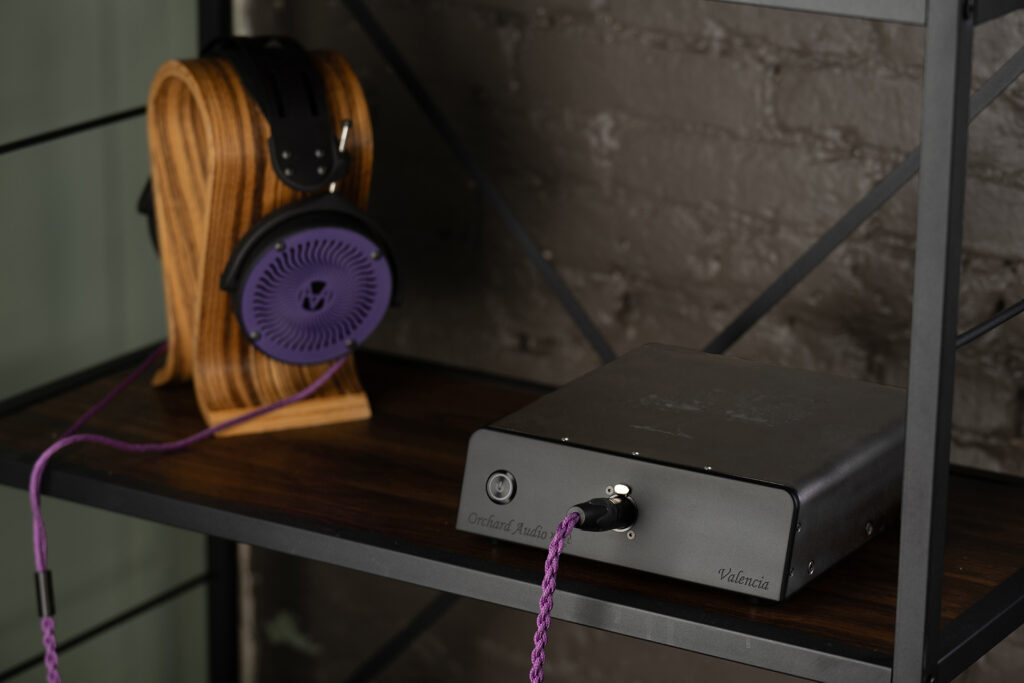Orchard Audio is thrilled to announce it is expanding into the headphone market with the launch of Valencia, the first ultra-high-performance 17wpc, class AB, balanced headphone power amplifier. Valencia is designed to drive the most demanding headphones, while remaining clean enough to support highly sensitive ones. Valencia is also capable of powering high-sensitivity speakers, delivering 7 watts into 8Ω.
Valencia represents Orchard Audio’s first collaboration, joining forces with respected long-time audio commentator Z-Reviews. The unique transparent properties of Orchard Audio’s line of speaker power amps – coupled with Z-Reviews’ industry insights and expertise – elevates audio engineering and delivers unparalleled performance and quality to customers in the headphone market.

Product Highlights/Features:
- Amplification Design: A fully balanced power amplifier from input to output, featuring independent linear power supplies for each channel. The design also minimizes noise and distortion through circuit path simplicity. This preserves the natural detail and nuance of your music.
- Timeless Design: A sleek, modern, sandblasted aluminum chassis and unique angled fascia blends in with other high-end desktop gear or the Orchard Audio PecanPi+ Streamers. Available in anodized black or natural aluminum finishes, to match your setup’s aesthetic.
- Gain: 14dB
- Signal to Noise Ratio (SNR): > 134dB (A-weighted)
- Output Power: 17W into 32Ω (See the Orchard Audio website for a full list of power numbers for impedances from 8Ω to 600Ω.)
“We are incredibly excited to introduce Valencia to music lovers and enthusiasts.” said Orchard Audio owner, Leo Ayzenshtat. “This amplifier embodies our commitment to delivering superior audio experiences, and we believe it will set a new standard in the industry.”
Availability:
Discounted preorder pricing is $1,599.95 ($1,999.95 MSRP). Preorders may be placed on the Orchard Audio website. Valencia will make its official debut in Chicago at AXPONA, with shipments starting in late April 2025. Valencia can also be seen at the NYC CanJam later this month.
The Audiophile History of Orchard Audio
Orchard Audio is a U.S.-based audio company that has carved out a unique space in the high-performance audiophile world through a focus on minimalist design, engineering transparency, and the adoption of cutting-edge technologies like Gallium Nitride (GaN) for amplifier development. Founded by Leo Ayzenshtat in the late 2010s, Orchard Audio didn’t come from the traditional high-end audio playbook. Instead, it emerged from a background in precision electronics and systems engineering—fields that would ultimately shape the company’s core philosophy and product offerings.
Leo Ayzenshtat: From Aerospace to Audio
Leo Ayzenshtat began his career not in hi-fi, but in industries with strict engineering standards. With a background in electrical engineering, he worked for companies involved in aerospace, defense, and industrial electronics, including designing circuits for highly regulated environments. This experience gave him a strong foundation in board-level design, power regulation, and digital systems—skills that would later be applied to Orchard Audio’s products.
In 2017, Ayzenshtat launched Orchard Audio as a side project, initially offering DAC boards and amplifier modules aimed at the DIY community. The name “Orchard Audio” quickly began circulating among hobbyists looking for high-quality digital components that didn’t rely on marketing claims or boutique pricing. The products were compact, direct, and engineered with measurable performance in mind.
Early Products and Design Philosophy
One of Orchard Audio’s first standout offerings was the PecanPi DAC, a high-resolution digital-to-analog converter designed to interface directly with the Raspberry Pi platform. It used the Burr-Brown PCM1794A chip, a well-regarded DAC architecture known for its balanced output and natural tonality. The board was engineered with careful attention to layout and grounding, and the analog output stage was fully differential—rare at its price point.
Orchard Audio then expanded the concept with the PecanPi Streamer, combining the DAC with a Raspberry Pi and a custom linear power supply in a compact enclosure. This product marked a shift from pure DIY modules to complete, ready-to-use components that could serve as the digital front end of a serious two-channel audio system.
Leo’s design approach has consistently emphasized clean power, short signal paths, and low noise. Orchard Audio’s gear typically avoids unnecessary features or visual embellishments, keeping the focus on audio quality. Measurements are openly published, and product decisions are often based on technical merits rather than trends.
The Rise of Gallium Nitride (GaN) Amplification
One of Orchard Audio’s most significant contributions to the audiophile market has been its early and focused adoption of Gallium Nitride (GaN) technology in Class D amplifiers. GaN semiconductors offer several advantages over traditional silicon-based MOSFETs. They switch faster, generate less heat, and allow for more compact, efficient designs. In audio applications, these characteristics translate into improved transient response, lower distortion, and higher efficiency—key traits for modern power amplifiers.
Orchard Audio’s Starkrimson amplifier series showcases this technology. First introduced as monoblock and stereo modules, and later in fully assembled amplifier units, the Starkrimson line uses GaN FETs in a proprietary Class D topology. The design supports high power output with very low noise and distortion, even into challenging speaker loads.
The Starkrimson Ultra amplifier brought even more refinement, offering balanced inputs, improved shielding, and tighter tolerance components. Users and reviewers have noted that these amplifiers offer a level of clarity and control that challenges not just other Class D amps, but traditional Class AB designs as well. Importantly, Orchard Audio has kept its GaN-based amplifiers relatively affordable, making this high-performance technology accessible to a wider audience.
Direct-to-Consumer and DIY-Friendly Model
Orchard Audio’s business model is built around direct-to-consumer sales. This allows the company to avoid dealer markups and maintain a closer connection with its customer base. It also enables faster development cycles and direct feedback from users. Many Orchard Audio products are offered both as finished components and as DIY kits or modules, appealing to hobbyists who want to build or integrate their own systems.
Support and documentation are another strong point. Leo maintains a close relationship with his customer base, often responding directly to questions and feedback. Firmware updates, software recommendations, and customization options are commonly shared, reinforcing the company’s engineer-first, customer-facing culture.



